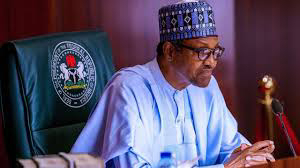Vice-Chancellors(VCs) of Nigerian Universities have appealed to President Muhammadu Buhari to take charge and speed up the process of resolving the ongoing trade union dispute between Academic Staff Union of Universities (ASUU) and other unions in tertiary institutions in the country.
The vice-chancellors under the aegis of Committee of Vice-Chancellors of Nigerian Universities, (CVCNU), said their call was necessitated by the impact of the strike on both students and the institutions.
"We plead that drastic action is taken to stem the haemorrhage that the system is currently witnessing. For the sake of our children and our society, we need a decisive decision,” Chairman of CVCNU, Prof. Samuel Edoumiekumo.
He spoke at the public presentation of the Model Intellectual Property for Nigerian universities, unveiled on Thursday, in Abuja.
The document is the outcome of collaboration between the Nigerian Copyright Commission (NCC) and the CVCNU with support from the National Universities Commission (NUC) and the Office of Technology Acquisition and Promotion (NOTAP).
According to the vice-chancellors, the objective of the intellectual property for universities was to promote the generation, sustainable utilisation and better management of intellectual property in Nigerian universities.
Edoumiekumo explained that the journey to the presentation of the intellectual property policy document began in 2020 when the NCC and the CVCNU met and compared notes on possible areas of collaboration.
He added: “Intellectual property became the focal point of the deliberation given its essential role in the academic operations of universities in particular and the principal role of ideas in a knowledge-driven economy and society.
"Over the years, there have been several attempts by the Copyright Commission, which is the regulatory body, to ensure that academic institutions properly codify their intellectual property policies to conform with the World Intellectual Property format.
“The CVCNU recognised this as a significant venture and worked with the NCC to develop a model intellectual property policy upon which universities that do not currently have one can build.
The model policy document went through six stages of preparation. It conforms with the World Intellectual Property Organisations, (WIPO) format on IP policy development and contains clauses that clearly state the ownership of ideas and inventions that are developed with resources from the universities and the rights of use.
“It clarifies issues relating to research contracts, incentives, rewards and compensation for intellectual property that arise from its commercialisation. It advises on how to maintain IP assets and resolve conflicts of interests, conflicts of commitments and other disputes. A vital part of the draft document is how to accommodate Expression of Folklore, Traditional Knowledge and Genetic Resources in our IP policy document.
“Following today’s presentation we expect our universities to develop their policies based on their particular operating environment and upload their final Senate approved copies of the WIPO portal for global access.
“The CVCNU will track this development and constantly report to its members’ and stakeholders’ progress in this regard.”
Chairman, Governing Board of NCC, Prof. Esther Animi, lamented the increasing rate of plagiarism in universities even as she expressed happiness that vice-chancellors were already addressing the menace satisfactorily.
Noting that only 20 out of the 217 current universities in Nigeria had functional intellectual property policies, Prof. Animi said: “With this model that has been developed by experts from the university system and the IP world, Nigeria should see significant increase in revenue generation, wealth creation and youth employment through the creativity and innovation that abound in the universities.
“This in turn should also raise the ranking of Nigerian Universities and provide an additional source of revenue for the sustainable development of the education sector.
“A Policy is only as good as its implementation and IP protection would be worthless if it does not translate to benefits for those that create or innovate or add value to society. Hence the need to promote the strategic and balanced management of the IP system and the subsectors in the value chain.
“I would therefore urge our universities to adopt the Model IP Policy as part of their internal framework to guide the institution, staff, students and visitors. Considering that research and integration are integral to the mandate of universities, I would recommend that the National Universities Commission
should henceforth make it a mandatory requirement for accreditation that every University must have an IP Policy.
“There has been a radical shift in the global development index. Rich nations are no longer measured by the physical assets they generate, but by the soft creative power that drives national growth and development.
“As mineral resources gradually become irrelevant, the economy of ideas and innovation is taking over, and we are witnessing the rise of smaller nations with limited production Capacities becoming leading world economic powers and technology hubs.
“Nigeria cannot afford to lag behind in this new revolution and our Universities must take the lead in turning Nigeria to a knowledge-driven, globally competitive economy. Working with the CVCNU and other agencies, the Nigerian Copyright Commission will be willing to assist universities in the customisation and implementation of the Model IP Policy.
“As CVCNU marks its diamond jubilee this year, it is my hope that we can have at least the first 60 Universities sign up to the Model Policy before the end of the year.”

Comments
Post a Comment